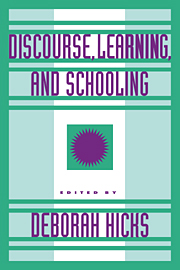Book contents
- Frontmatter
- Contents
- List of Contributors
- Acknowledgments
- 1 Introduction
- Part I Classroom discourses
- Part II Literacy, psychology, and pedagogy
- Part III Discourse and literacies
- 7 Sticking to the point: talk about magnets as a context for engaging in scientific discourse
- 8 Biliteracy development in classrooms: social dynamics and cultural possibilities
- 9 The role of the Black Church in growing up literate: implications for literacy research
- Afterword
- Index
7 - Sticking to the point: talk about magnets as a context for engaging in scientific discourse
Published online by Cambridge University Press: 03 May 2010
- Frontmatter
- Contents
- List of Contributors
- Acknowledgments
- 1 Introduction
- Part I Classroom discourses
- Part II Literacy, psychology, and pedagogy
- Part III Discourse and literacies
- 7 Sticking to the point: talk about magnets as a context for engaging in scientific discourse
- 8 Biliteracy development in classrooms: social dynamics and cultural possibilities
- 9 The role of the Black Church in growing up literate: implications for literacy research
- Afterword
- Index
Summary
Introduction
This chapter presents data on how children and their mothers talk about magnets. We wanted to know whether discussion between mothers and 5-year-old children on the topic of magnets would be an occasion for scientific discourse, and whether such discourse would be characterized by explanations that differed in form from the more commonly studied narrative talk. Our curiosity about scientific discourse has a number of sources: (1) less interest in children's ability to coconstruct with adults stretches of discourse on a particular topic, on the assumption that such extended discourses require knowledge of rules that go beyond the grammatical rules that govern utterance production; (2) interest in testing the hypothesis that experience with such extended discourse contexts is a good predictor of children's literacy skills and school achievement as they enter the middle grades of elementary school; and (3) interest in seeing whether mother–child discourse about science topics might have some features that could prepare children for classroom discourse on topics of science, social studies, and math. In this chapter, we focus first on the relationship of oral language extended discourse to literacy, and in the discussion we turn to the question of the features of science talk, both at home and in the classroom.
Oral language skills relate to literacy
It has been widely observed that children's oral language skills relate to their literacy skills. For example, the best simple predictor of reading skills is children's vocabularies (Anderson & Freebody, 1981).
- Type
- Chapter
- Information
- Discourse, Learning, and Schooling , pp. 189 - 220Publisher: Cambridge University PressPrint publication year: 1996
- 21
- Cited by

